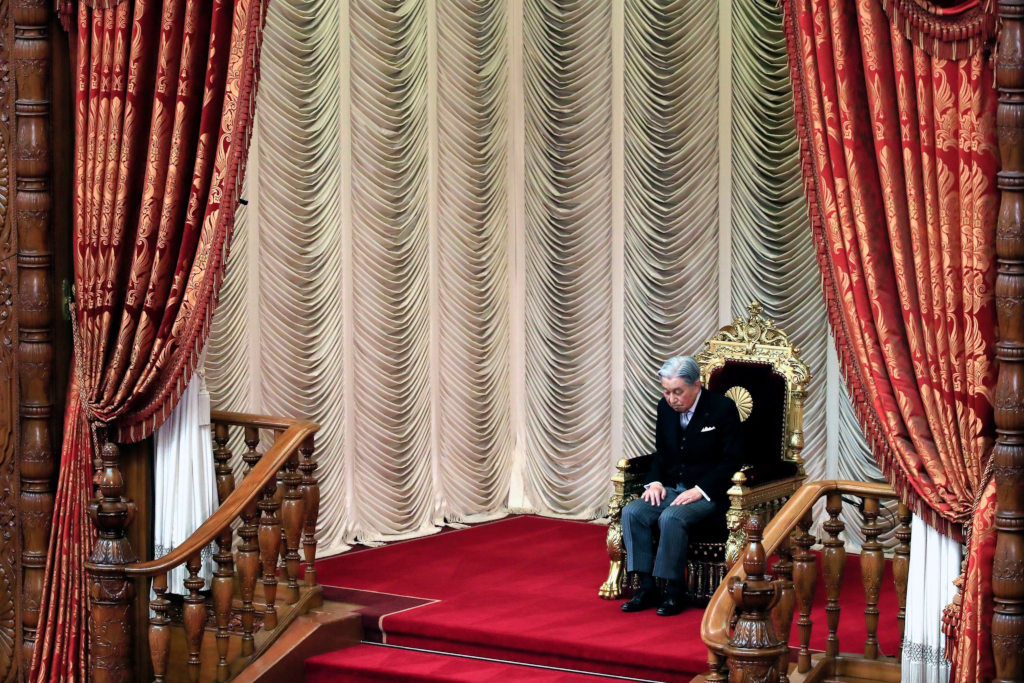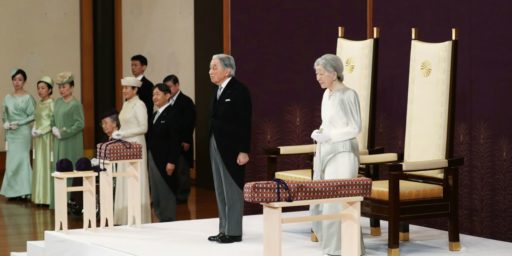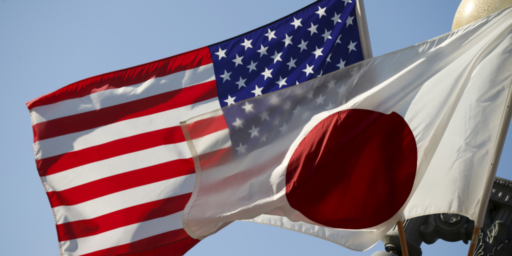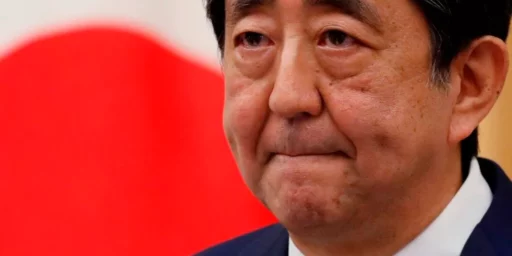Japan’s Y2K
Japan will be getting a new Emperor on May 1st. That means a new calendar and a whole lot of headaches.

Thanks to the decision of Emperor Akhito to abdicate the throne in favor of his oldest son, Japan will be getting a new Emperor in the near future. While the ascension of Crown Prince Naruhito to the Chrysanthemum Throne on May 1st won’t result in any real political changes in Japan since the Emperor is now a mere figurehead, it will result in some real headaches for Japanese government officials and corporations:
TOKYO — Lost data. Emails that disappear into the ether. Servers that never connect.
All thanks to the ascension of a new emperor to the Chrysanthemum Throne.
Japan is scrambling to update software, revise forms and print new calendars before May 1, when the world’s third-largest economy begins a new imperial era. For most of the rest of the world, it will remain the year 2019 when the clock strikes midnight. Across Japan, which relies internally on an ancient calendar that honors a reigning emperor, it will be the first day of the first year of the age of Reiwa.
The new era, christened just weeks ago, will force the country’s sprawling bureaucracy to literally turn back the clock to Year 1. Experts compare it to Y2K, the digital threat in the lead-up to the year 2000, if on a much smaller and less consequential scale.
“The change of the era name will have a huge effect on big companies that have complicated systems,” said Gaku Moriya, deputy director of the information technology innovation division at Japan’s Ministry of Economy, Trade and Industry, or METI.
Major companies with relatively modern systems will most likely handle the shift with aplomb. Still, the full consequences are not entirely clear, and for many the change will not be cheap. Every government form, including tax returns and marriage registrations, uses the imperial-style calendar, making it impossible for government workers and companies to avoid.
Already the tally is mounting. The city of Nagoya, an industrial center in central Japan, estimates it alone will spend about $4.3 million dollars preparing for the new era. In the city of Koga, employees preparing for the changeover accidentally erased 1,650 water bills. Scam artists have sent out letters that target older people, telling them to submit personal information to ensure that their bank accounts make the transition, according to the national broadcaster NHK.
For those companies that cannot get their paperwork in order by the deadline, METI recommends a distinctly old-school solution: correcting documents with rubber stamps bearing the Japanese characters for the new year.
At a small factory in the outskirts of Tokyo, just three days after the “Reiwa” name was announced, Osamu Takiguchi and a crew of about 20 worked overtime to rush out orders of the distinctly Japanese product.
This isn’t the first time in the modern era that this has happened, of course. Similar changes had to be made in 1989 when Emperor Akihito succeeded his father Hirohito, but that happened in an era when most business was still conducted on paper, digital records were not as extensive as they are today, and Japan was somewhat less attached to a global economy that relies almost exclusively on the Gregorian Calendar. All of this has led some Japanese to wonder if it wasn’t time to abandon the ancient calendar altogether:
The headaches have prompted a national conversation over whether it is finally time for Japan to move entirely over to the Gregorian calendar. The country uses the Gregorian calendar when dealing with other countries and to coordinate global events, such as the 2020 Olympics. Most people here have also already adopted it in their personal lives.
One lawyer, Jiro Yamane, has even sued the government over the change, arguing that forcing people to measure time by the life of the emperor violates their constitutional right to individual dignity.
“Only Japan exists in this different space and dimension of time,” said Mr. Yamane, who is scheduled to argue his case in front of a Tokyo district court at the end of May. “It’s incompatible with international society.”
“Why are the Japanese so hung up on it?” he added.
It may just be that Japan has a hard time letting go. The country still depends on fax machines. It is one of the last places in the world where Tower Records, the once iconic music store, has stayed open, still selling CDs.
(…)
The Japanese adopted the imperial calendar from the Chinese in the seventh century, and government agencies have been required to use it since the late 1970s. Other countries in the region, including China itself, have moved on and adopted the Gregorian calendar for official business.
Japan hasn’t had to face a calendar change for a generation — and that was before the hyper-speed computer era.
In 1989, when the calendar switched to the Heisei era from the Showa, the announcement was made the same day that Emperor Hirohito died.
Within 24 hours, much of the initial work of replacing signs and updating forms was done by hand.
This time, the transition has been more orderly. The abdication date for the current emperor, Akihito, was announced in late 2017, giving the nation nearly a year and a half to get ready.
Many did not. As of March, one-fifth of over 2,700 companies polled by METI had not taken steps to prepare for the switch, the agency said.
Officials compounded the problem by keeping the new era’s name secret until April 1, just one month before the transition.
Government offices and domestic financial institutions, some of which rely on outdated computer systems, are the most likely to encounter problems, according to Mr. Moriya of METI.
“Some private companies may not be sufficiently aware of the issue, and don’t know what kind of problems they will have,” he said, adding that the agency had been holding private seminars to raise awareness.
In all likelihood, the Japanese will handle this change with their typical aplomb and efficiency and. in typical Japanese style, there will be little complaining on the part of the public, much of which probably won’t be impacted by the change at all. At the same time, though, one does wonder why the Japanese haven’t abandoned this calendar ages ago. Of course, then one must remember that there have been Emperors in Japan dating back to 660 B.C. Tradition runs strong in Japan, and this is one tradition that seems to be staying firmly in place despite the change in the role of the Emperor. The good news for Japan is the Naruhito will ascend the throne at the relatively young age of 59 so they probably won’t have to deal with this again for another 30 years or so.






This sounds like somewhat poor planning from an otherwise obsessively organized nation. Considering this change could happen at literally any time due to the death of the Emperor, this strikes me as something that *really* should have been planned for as an eventuality and had processes in place. They got lucky and got forewarning – can you imagine if Emperor Akhito had passed on unexpectedly and the chaos it would have caused?
Sad to say this could very well happen again at any time. 59 is “young” age only recently and accidents know no age. If your calendar needs to be periodically reset at a moment’s notice, it would behoove you to build into your bureaucracy and tech a swift way to react to it.
@KM:
The biggest problem seems to be the fact that despite the fact that they knew the change was coming more than a year ago, the Imperial House dragged its feet when it came to the official designation of the new era that would come with Naruhito’s ascending the throne. They didn’t announce the name until this month. Had they done so earlier, this probably would not be an issue at all.
Counting years from an event is the more common means of keeping time, though the event varies a great deal. Using regnal years only is far from uncommon, but also never quite got to be the norm. Egypt counted that way. I’d no idea Japan did as well.
What stuns me is this:
I really can’t conceive a modern, industrialized nation in the 70s thinking that adopting a pre-medieval calendar makes sense. It must be a typo or miscommunication.
BTW, most Y2K issues did take place, only before the year 2000. For example, credit cards issued in the mid-90s marked as having expired over 90 years ago and such.
It’s not that the computer systems are “outdated”–quite often they’re hung on to because it’s the only machine that can deal with the government forms because of the format the government forms are written in.
And yeah, I really doubt the Japanese are going to get rid of the Japanese calendar. It’s tradition…..
(The other three non-Western calendars you will run into are the Jewish calendar, the Islamic calendar, and the ROC calendar that Taiwan uses. Add to that the fact that dates in most countries are written Day/Month/Year as opposed to Month/Day/Year and you can see why communications containing due dates can be….complicated.)
@grumpy realist:
I don’t understand why we don’t do the more logical 20190424, which is much better for sorting, math, etc.
Wasn’t that about the time the last push was made to get the US on to the metric system?
@Joe:
Unless you count the unlamented campaign of Lincoln Chafee in 2016, and nobody does, yes.
“I don’t understand why we don’t do the more logical 20190424…”
That’s easy; because we don’t, that’s why.
@Just nutha ignint cracker: DAY-MONTH-YEAR, or YEAR-MONTH-DAY, just not the US MONTH-DAY-YEAR, please.
@grumpy realist:
Mainland China still uses the lunar calendar for a lot of things (mostly not business-related). The most notable is Spring Festival (i.e., Chinese New Year), which is very significant for Chinese businesses. For Chinese businesses, January 1 is only significant for budget and finance. Chun Jie (Spring Festival) is when “doing business” restarts (especially since some industries lose up to 20% of their workers over the festival–they go home with a fat year-end bonus and don’t bother coming back).
As for date formats, YYYY-MM-DD is the ISO international standard.
@grumpy realist:
Sometimes the “outdated” systems are better.
The software I used for payroll, accounting, and sales in my old job, was written for DOS, and we started using it in 1990 or so. I kept with the DOS version until 2005, when I left the job, though running it in a WinXP machine, partly becasue they kept releasing new DOS versions. But mostly because it was superior to the Windows version. You could enter reams of data, or make tons of invoices, or process the payroll, without ever taking your hands off the keyboard. The windows versions I tried required frequent detours to the mouse.
It also had an integrated spreadsheet and word processor. Nowhere near as good as Excel or Word, true, but these could read data off the accounting and payroll programs, which the MS products couldn’t.
Well, enough reminiscing for now.
BTW, I’ve visited Israel twice, and I don’t recall whether the Jewish calendar or the Gregorian are used in the course of business.
@Kathy:
And you have identified why every update to Windows and to Word frustrates me more and more. Because I like to keep my fingers on the keyboard and my eyes on the screen. Mouse options – fine for children. Take away the keyboard shortcuts, and I learn to hate in a special way.
@Yixiao: Yah, I don’t remember running into any use of the Chinese calendar when dealing with Chinese patent work. Japanese office actions (and anything else official) invariably stated the year using the Japanese calendar. One of the little Post-its I had on my desk had the conversion between Western and Japanese years. Guess I’ll have to make up another for Reiwa Gannen being 2019…..
Actually, am very happy to see that the ex-Emperor is getting a chance (I hope) to get out from under all the pomp and ceremony associated with his position and to just relax.
@Joe:
I didn’t see nay point at all to Windows until the Web took off. Prior to that, I stuck to DOS for everything, including some early use of the internet.
There are some advantages to a graphic interface, and I’ve grown used (and perhaps resigned) to the mouse. But my war against Windows 8 (*) began the minute I heard it required a touch screen. Really, as if we don’t have enough forced input distractions already. I’m glad it flopped. Windows 10 is not the best interface MS has ever done, but it’s also not the worst.
(*) I took to calling it WINDOS, which stands for Windows 8 Is Not a Desktop Operating System.